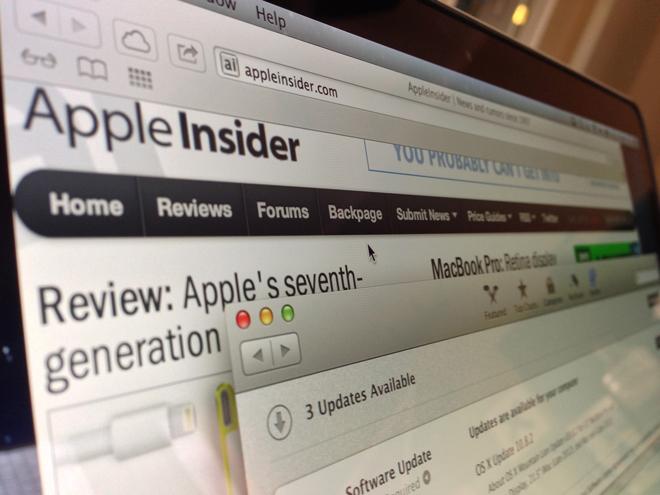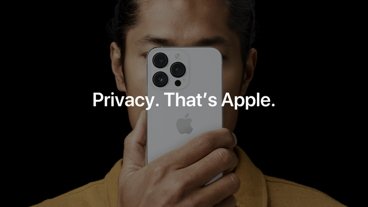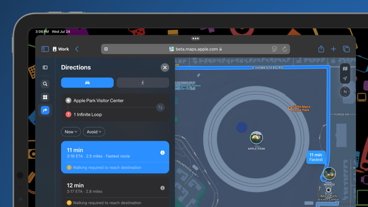Black Friday sales of Windows notebooks down 10%, Apple's MacBooks stay flat
Retail sales of Apple notebooks on Black Friday were flat year over year as overall consumer electronics sales declined nearly 6 percent, while sales of Windows-based notebooks plummeted 10 percent despite the launch of Windows 8.
The NPD Group announced on Tuesday that U.S. consumer electronics retail sales for Black Friday declined 5.6 percent, which was a steeper than anticipated drop. NPD's tracking of consumer electronics excludes Apple's iPad, as well as Kindle products, Microsoft Surface, mobile phones and video games.
Retail sales data from Nov. 18 through 24 found that sales of Windows-based notebooks were down 10 percent. Sales of Apple notebooks, meanwhile, were flat with 2011.
The decline in Windows notebook sales came despite the fact that Microsoft recently launched its new Windows 8 platform. Devices running Windows 8 represented 89 percent of notebook sales with an average selling price of $368, while touchscreens accounted for 3 percent of sales with an average selling price of $668.
Most of Apple's MacBook lineup was refreshed this summer, but the company did launch its 13-inch MacBook Pro with Retina display in October. That machine carries a $500 premium over the legacy non-Retina 13-inch MacBook Pro, which Apple continues to offer.
Though overall notebook sales were down 10 percent year over year for the 2012 Black Friday shopping holiday, revenue was only down 5 percent. That's because the average selling price of notebooks increased from $437 in 2011 to $460 in 2012.
Beyond notebook computers, sales of Android-based tablets were up 177 percent year over year. Revenue was up about half as much, as the average selling price of Android tablets plummeted from $219 to $151.
Sales of flat panel TVs were also up slightly, earning a 4 percent increase from 2011. But 2012 revenue on flat panel TVs for Black Friday was down 6 percent, as the average selling price dropped from $367 a year ago to $333 this year.
MP3 players saw a steep drop this year, as sales fell 24 percent. And Black Friday sales of point-and-shoot cameras plummeted 36 percent this year as consumers rely largely on other devices, like their smartphone, for photo taking.
"This slow start is merely a continuation of the challenges seen in the consumer electronics business throughout 2012," said Stephen Baker, vice president of industry analysis at NPD. "In an unbalanced market, where just a few categories deliver significant dollars, and even fewer offer any growth, the ability to deliver positive results will remain difficult for companies exposed to the entire consumer electronics marketplace."
 Neil Hughes
Neil Hughes














 Amber Neely
Amber Neely
 Thomas Sibilly
Thomas Sibilly
 AppleInsider Staff
AppleInsider Staff
 William Gallagher
William Gallagher
 Malcolm Owen
Malcolm Owen
 Christine McKee
Christine McKee









56 Comments
Why don't they take into account tablets? It is known well that tablets are cannibalizing laptop/desktop sales rapidly. Apple's model is to disrupt others as well as its existing product lines. See here and read Meeker's slide deck http://venturebeat.com/2012/12/03/mary-meeker-releases-stunning-data-on-the-state-of-the-internet/
We'll see what happens in the full quarter. At first blush, it seems like Android manufacturers are buying market share by going further and further downmarket (those $159 Kindle Fires and $199 Nexus 7s must be fairly popular), while Ultrabooks seem to be struggling to catch on. My guess is the rMBP (13" and 15") is a bit too niche still to make much of a dent in MacBook sales, while the rest of the lineup is solidly mid-cycle. iPhone drives most of Apple's stock price, so it's a good sign that supply seems to be catching up. As a shareholder, I'd like to see Apple surprise a bit and sell 50 million this quarter (most analysts are expecting 46-48 million). It will also be interesting to see how the iPad sells now that the mini is in the lineup, and what that does to margins. Apple likely won't break out sales by model, but the margin will give analysts some data to work with.
Just bought my Mrs a 13" MacBook Pro was holding out with faint hope that Apple would release a 13" MacBook, any 13" MacBook that did not come with just the crud Intel only graphics. Had it not been for the integrated graphics Apple would have easily upsold me to the retina model.
I think Ultrabooks have been a failure. On the PC side people are accustomed to cheap laptops that they can get for $500 or whatever. That's not an Ultrabook.
"while sales of Windows-based notebooks plummeted 10 percent because of the launch of Windows 8."
Just thought I'd fix the article.